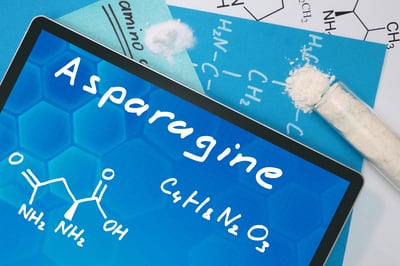FORCE's eXamining the Relevance of Articles for You (XRAY) program looks behind the headlines of cancer news to help you understand what the research means for you.
XRAY is a reliable source of hereditary cancer research-related news and information.
Learn more about the XRAY program
In portal: Breast Cancer, Categories Nutrition & Exercise
Relevance: Low


Strength of Science: Medium


Research Timeline: Animal Studies


Study : Is asparagus linked to breast cancer metastasis?
Relevance: Low


Strength of Science: Medium


Research Timeline: Animal Studies


Most relevant for: People diagnosed with breast cancer
A study published in the journal Nature shows that asparagine, a protein building block that takes its name from asparagus, promotes the spread of breast cancer in mice. The study by cancer experts from Britain, Canada and the U.S. investigated whether limiting the levels of asparagine in mice could reduce tumor metastasis. (3/2/18)
Read More
Study : Alcohol and breast cancer risk in African American women
Most relevant for: African American women who would like to lower their breast cancer risk
The link between alcohol intake and breast cancer is well known, but most studies have involved only White women. Recently, a large study of more than 22,000 African American (AA) women found that similar to White women, increased alcohol consumption is associated with a greater risk of breast cancer. (10/27/17)
Read More
Article : Can lifestyle changes impact breast cancer risk?
Most relevant for: Any woman concerned about her risk for breast cancer
A recent New York Times article shared how “adopting protective living habits” could help keep breast cancer “at bay”. While many of these lifestyle changes and strategies like not smoking, avoiding weight gain, reducing alcohol consumption, eating a heart-healthy diet, and increasing physical activity have been shown to reduce breast cancer risk, there are other risk factors that one cannot control such as having a BRCA or other mutation that significantly increases breast cancer risk. Importantly, no one strategy has been proven to totally eliminate breast cancer risk. However many of these approaches have overall health benefits. (9/21/2017)
Read More
Study : Diet during teen years and early adulthood is linked to breast cancer risk
Most relevant for: Adolescent and young adult women
During teen years, breast tissue grows rapidly in young girls and is more likely to be harmed by substances that are known to cause cancer. Few studies have looked at the relationship between diet during puberty and breast cancer risk. This study looks at how a woman’s diet during their teenage years and early adulthood is associated with breast cancer development later in life. (6/30/17)
Read More
Article : FDA busts myths of preventing and treating cancer by eating apricot kernels, herbs, and other ingredients
Most relevant for: People diagnosed with or concerned about their risk for cancer
Maggie Fox (NBC News) writes about a new FDA report that warns of 14 "fraudulent” cancer products claiming to either cure or treat cancer (1). The companies that sell these products claim that many of them also prevent cancer, but are they safe or effective? (6/26/17)
Read More
Study : Does eating soy affect the risk of death in breast cancer survivors?
Most relevant for:
Is eating soy safe for people who have had breast cancer? This topic has been controversial among health care providers, patients, and survivors for many years because research has yielded mixed results. Some studies suggest people who have been diagnosed with breast cancer should eat more soy products, while other studies recommend they eat less or avoid it altogether. Which should it be? Adding to this research is a new study that asked breast cancer survivors about their soy consumption before and after diagnosis. (4/27/17)
Read More
Relevance: Medium-High


Strength of Science: Medium


Research Timeline: Human Research


Study : Research suggests exercise is safe for breast cancer patients at risk for lymphedema
Relevance: Medium-High


Strength of Science: Medium


Research Timeline: Human Research


Most relevant for: People with, or at high risk for lymphedema after breast cancer
Patients and health care providers are often concerned about how exercise affects lymphedema (swelling in the arm or hand) in breast cancer survivors or other women who have had lymph node biopsy at the time of mastectomy. Research on this topic has been mixed. A new study suggests that exercise after breast cancer treatment does not lead to lymphedema or worsen existing lymphedema. However, because this study was small, more work needs to be done to understand the relationship between exercise and lymphedema in cancer survivors. (2/22/17)
Read More
Relevance: Medium-Low


Strength of Science: Medium-High


Research Timeline: Lab Research


Study : Hot chili pepper component slows growth and kills laboratory-grown breast cancer cells
Relevance: Medium-Low


Strength of Science: Medium-High


Research Timeline: Lab Research


Most relevant for: This research is not relevant to people yet
Finding new treatments that target triple-negative breast cancer is an area of great interest. An early step in developing these treatments is learning more about the biology of tumor in the laboratory. This study looked at how capsaicin, the spicy component of chili peppers, might work with a protein found in many cancers, including triple-negative breast cancer, to stop cancer cell growth. This is the first step in a long process towards developing new treatments for triple-negative breast cancer. (2/14/17)
Read More
Relevance: Medium-High


Strength of Science: Medium


Research Timeline: Human Research


Study : High vitamin D levels at breast cancer diagnosis may be associated with a better prognosis
Relevance: Medium-High


Strength of Science: Medium


Research Timeline: Human Research


Most relevant for: Women at average risk for breast cancer and newly diagnosed women
Vitamin D is most known for its role in maintaining bone health but vitamin D has additional roles in keeping us healthy. In this study, researchers found that breast cancer patients who had the highest amounts of vitamin D in their blood (slightly over the recommended levels) had better health outcomes, including overall survival, than women with lower amounts of vitamin D. This finding adds to the growing evidence for the role of vitamin D in cancer, but it does not change how breast cancer is prevented or treated. (1/10/17)
Read More
Relevance: Medium-High


Strength of Science: Medium


Research Timeline: Human Research


Study : Is there a link between exercise and memory in breast cancer survivors?
Relevance: Medium-High


Strength of Science: Medium


Research Timeline: Human Research


Most relevant for: People diagnosed with early stage breast cancer
Exercise has many health benefits, but can it also help improve memory for breast cancer survivors? This research finds that breast cancer survivors who exercised more had less fatigue and distress (anxiety, depression, stress, and/or concern about recurrence) and scored better on memory tests. (8/2/16)
Read More